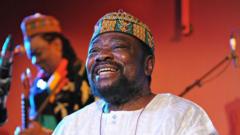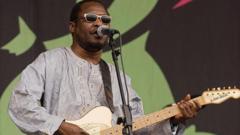The legacy of Teddy Osei, a renowned Ghanaian saxophonist and co-founder of the iconic Afro-rock band Osibisa, lives on. His innovative fusion of traditional African music with global genres elevated the sound of African music on an international stage.**
Remembering Teddy Osei: The Afro-Rock Pioneer Who Changed the Music Landscape**

Remembering Teddy Osei: The Afro-Rock Pioneer Who Changed the Music Landscape**
The influential co-founder of Osibisa and Ghanaian music legend Teddy Osei has passed away at 88, leaving behind a rich musical legacy.**
Ghana has lost a musical icon with the passing of Teddy Osei, the legendary saxophonist and co-founder of the Afro-rock band Osibisa, at the age of 88 in London. Osei’s contributions to the music world were described as "an important voice in music and culture" by those who knew him best. The Musicians Union of Ghana (Musiga) expressed their condolences, highlighting Osei's vital role as a cultural ambassador who connected African rhythms with global sounds.
Born on December 1, 1937, in Kumasi, Ghana, Osei's love for music was nurtured by his father, who was involved in school bands. He gained further musical insight while studying music and drama in London during the early 1960s. It was during this time that he formed his first band, Cat's Paw, which showcased a blend of highlife rhythms and rock and soul influences.
In 1969, Osei co-founded Osibisa, a groundbreaking Afro-Rock group that emerged as one of Africa's first internationally recognized bands. The name "Osibisa" derives from a Fante word meaning "highlife," reflecting the band’s mission to innovate within the genre. Under Osei’s leadership, Osibisa's fusion of Afro-centric sounds with rock, soul, jazz, and funk gained them significant acclaim, and hits like "Sunshine Day" and "Dance the Body Music" resonated across the globe.
Osei’s influence extended beyond Osibisa's musical achievements; he played a critical role in establishing a platform for African music on the world stage. He believed deeply in making a difference in the African music scene, famously asserting that without Osibisa, there might not have been a Fela Kuti, the iconic figure often regarded as the godfather of Afrobeat.
One notable performance by the band was at Zimbabwe's independence celebrations in 1980, sharing the stage with renowned artists like Bob Marley. Osei's dedication to promoting African music left an enduring impact, giving many artists confidence in their own sounds.
As tributes pour in from around the world, Osei's passing is a stark reminder of the profound influence he had in connecting diverse audiences through music. His legacy continues to inspire new generations of artists and musicians, ensuring that his innovative spirit will resonate for years to come.














